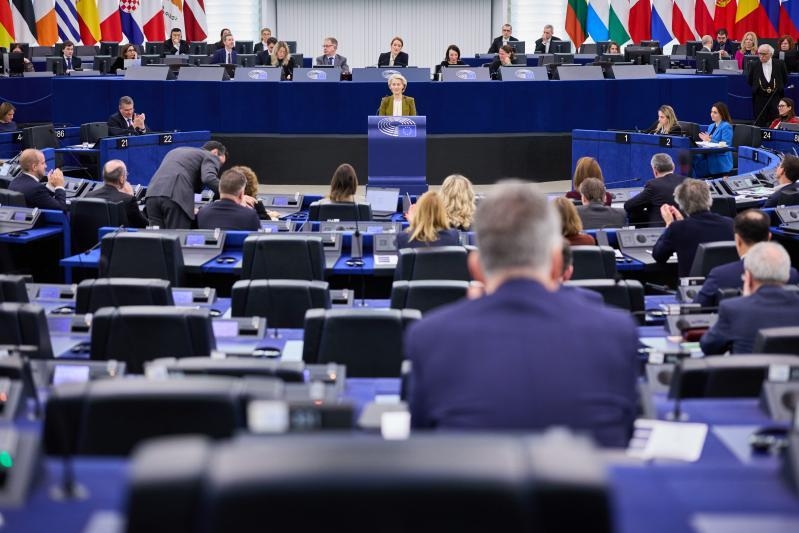
Joint letter – ICC reform and expansion risks diverting ETS Revenues from real climate action
In light of the European Commission’s ongoing considerations to amend the ETS State Aid Guidelines, revising the rules for Indirec...
News

Publish date: December 13, 2023
News
World leaders have finally called for the beginning of the end of fossil fuels, falling short of the anticipated ‘phase-out’. Bellona recognises the significance of this agreement, but regrets Parties’ failure to commit to the end of the fossil fuel era and the presence of multiple loopholes.
Countries have globally agreed that they need to transition “away from fossil fuels in energy systems, in a just, orderly and equitable manner, accelerating action in this critical decade, so as to achieve net zero by 2050”. Crucially, this applies to all fossil fuels, in the short term, and without the unhelpfully ambiguous term ‘unabated’.
«Even though the final text reaffirms Parties’ commitment to act in “keeping with the science”, the COP outcome remains far from the 1.5-degree pathway agreed eight years ago. While the agreement is a step forward, it is no cause for celebration but a call for further action»

Mark Preston Aragonès
Head of Carbon Accounting
Bellona recognises that COP agreements require global consensus and usually reflect the lowest common denominator. The decision should therefore be understood as a floor for climate action, and Bellona urges Norway and the European Union to set the bar much higher in their Nationally Determined Contributions (NDCs), due to be updated by COP30 in 2025.
Bellona welcomes the inclusion of specific language on “tripling renewable capacity globally and doubling the global annual rate of energy efficiency improvements” in this decade, as well as “accelerating the reduction of emissions from road transport” by accelerating the deployment of infrastructure and vehicles. This is a very positive signal which, in conjunction with the signal to shift away from fossil fuels, strengthens the call to transition towards a renewables-based energy system. But again, clarity and safeguards will be necessary:
«It’s crucial to protect this commitment from overly ambitious low-carbon hydrogen goals that risk diverting precious renewables from high efficiency direct electrification applications to highly inefficient hydrogen-based solutions.»

Luisa Keßler
Policy Advisor, Sustainable Hydrogen Economy, Bellona Deutschland
The agreement calls for a transition to “net-zero emission energy systems”. The term “net-zero” sneaks in as a dangerous loophole. Bellona cautions against using and abusing the term “net-zero” which is often used to shoehorn offsetting via natural sinks or Carbon Dioxide Removal (CDR). CDR will be a scarce resource to counterbalance residual emissions and it is highly unlikely that there will be enough to balance out any fossil fuel use in energy systems.
Fossil fuels also generate significant emissions in non-energy sectors, such as feedstocks for steel production or fertilisers, which are conveniently left out of the scope of the agreement. In fact, the use of fossil fuels outside energy systems is expected to grow in the coming years.
Alluding to the role of fossil gas as a transitional fuel, at the behest of Russia and others, makes the commitment to transition away from fossil fuels in this decade unclear. It is unacceptable that fossil gas has been given a free pass, knowing it remains one of the primary sources of GHG emissions.
Another risk lies in betting on so-called “low-carbon” fuels, a term often misappropriated for carbon-based and electricity-guzzling synthetic fuels, which are deeply inefficient. On top of this, for any carbon-based fuels to be compatible with net-zero, the CO2 should originate from the atmosphere, adding another layer of inefficiency.
The mention of CCS as particularly relevant for ‘hard to abate’ sectors is a welcome clarification. CCS is a necessary tool for the decarbonisation of industrial sectors such as cement and may, in very limited circumstances, play a role in the power sector. Nevertheless, under no circumstances can we allow it to become a fig leaf or narrative to sustain the continued use of fossil fuels, such as in the power sector, which can and must switch to renewables. Environmental NGOs have expressed very valid concerns that CCS is being used as a justification to avoid the overall and rapid decline of fossil fuel production and use, which is obviously unacceptable.
Bellona is critical of the lack of definition of the term ‘abated fossil fuels’, which in the text is linked to phasing down ‘unabated’ coal power. While the EU was supportive of a phaseout of ‘unabated’ fossil fuels, the bloc should ensure it follows through on this position domestically. Moreover, the EU needs to clarify what it defines as “unabated” and push for a science-based definition in law, such that it may be used to implement emission limits.
This is also a missed opportunity to further tighten the screws on the fossil fuel industry as whole. A clear and science-based definition of “abated fossil fuels”, in conjunction with a ‘phaseout of unabated fossil fuels’, could have effectively ended the production and use of coal and oil, which in practice become impossible to deploy with such constraints. Such language could have signalled the end of oil and coal, while also substantially constraining the use of fossil gas. Future COPs will need to explore opportunities to manage the fossil fuel problem.
As with every COP, climate justice, inequality and fairness were prominent issues. A notable philosophical difference emerged in the debates on just transition, where developed countries focus on their workforce, while developing countries take a more holistic and international approach, considering sustainable development, poverty eradication and climate finance.
Moreover, measures such as the EU’s Carbon Border Adjustment Mechanism (CBAM) and the US Inflation Reduction Act (IRA) were heavily criticized for being unilateral and negatively impacting global trade. The EU must take these concerns into consideration: it is necessary to use these tools to foster higher climate ambition and integration, especially regarding carbon pricing systems and Carbon Border Adjustment.
«In order to keep 1.5 alive and reach carbon neutrality by 2050, all nations must pull their weight. However, developed countries must take the lead in achieving an almost entirely fossil free energy system well before mid-century, allowing developing countries to actually develop.»

Ariane Giraneza
Manager Climate Policy, Industrial Decarbonisation (NL-BE-NRW)
In the coming months and years, there is much work to do in tightening the gaps and ending the fossil fuel age. It is abundantly clear that a rapid decline in fossil fuels is necessary to limit global temperature increases to manageable levels.
During the negotiations, Bellona proposed text to reduce the use of fossil fuels in this decade and phase out fossil fuels by 2050, but also text to enable rapid emissions cuts and potential phase-out of all fossil emissions from the energy sector by 2035.
«Two points are essential to continue strengthening in subsequent negotiations: We need clear language on phase-out of fossil fuels by 2050 in line with the 1.5 degree target. But, at the same time we need deep and rapid cuts in emissions short to medium term and before the end of this decade. If we don’t do this, it will be very hard to solve the climate crisis.»

Hallstein Havåg
CEO
The fossil industry has a large role to play here and as for now, they are not doing their part of the job. Their huge pushback, brought on by massive numbers of lobbyists and the circulated OPEC letter calling to fight against a phase-out, needs to be confronted by countering their narratives. Bellona will continue to take on this role and will work towards COP29 to ensure scientifically sound clarifications and definitions of the terms in the COP28 outcomes.
All in all, COP28 sends a signal that fossil fuels will decline, even though vague wording has given the industry plenty of wiggle room to delay climate action. Beyond this, many workstreams have been postponed, such as Article 6, and little more has been agreed, much to the chagrin of the most vulnerable countries. Bellona will continue to work with countries, academia, trade unions, NGOs, and progressive industry actors to make sure finance, technology, and regulation pull together and towards rapid emissions reduction in this decade.

In light of the European Commission’s ongoing considerations to amend the ETS State Aid Guidelines, revising the rules for Indirec...

“The Commission shall monitor the situation at Union level with a view to monitoring the impact of the CBAM on the Union i...

In this week of industrial discussions, first at the Antwerp Industry Summit on February 12th and then at the informal EU leaders’ mee...

Ahead of the European Commission’s Industrial Accelerator Act proposal on February 25th, Bellona has joined 40 organisations from across indust...

Policy Roundtable Takeaways On December 18th, 2025, Bellona organised a policy roundtable gathering the Swedish construction value chain, public p...
Get our latest news